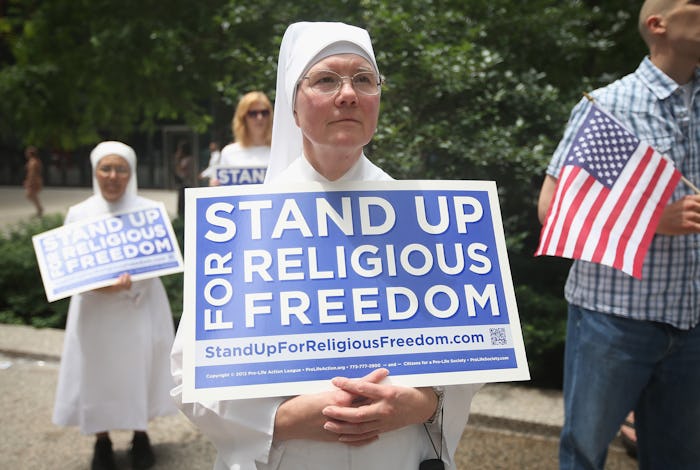News

The Cost Of Birth Control Without The Obamacare Mandate
President Donald Trump has already made it clear that he is certainly no fan of former President Barack Obama's Affordable Care Act, and that he also doesn't think there is enough federal protection for the rights of Christian groups and business owners in America. But now, the president appears to be preparing to double down on those beliefs: according to The Guardian, the Trump administration is attempting to roll back an Obamacare mandate requiring insurance companies to provide contraceptive coverage to women by allowing employers to opt-out on moral or religious grounds. How much will birth control be without the Obamacare mandate? It's likely that the legislation will lead to women once again having to pay out of pocket for contraception.
Earlier this month, Trump began to pave the way for the proposed move, after signing an executive order designed to “address conscience-based objections to the preventive-care mandate," according to NBC News. The preventative-care mandate ensured, among other things, that women could access contraception under their Obamacare marketplace plans without a co-pay, but it certainly wasn't without controversy: in a 2014 lawsuit involving craft store Hobby Lobby, the Supreme Court of the United States ruled that certain employers cannot be required by law to provide contraceptive coverage to their employees if it conflicts with the employer's religious beliefs, according to TIME. And exemptions from the mandate already existed for churches, and some non-profit religious organizations. But now it appears as though Trump wants to take that one step further, according to Vox, by allowing any employer to seek an exemption on moral or religious grounds.
According to Vox, a draft proposal is currently being reviewed by the Office of Management and Budget that would reportedly allow all employers the ability to seek exemptions from the ACA's preventative care mandate, going far beyond the current rules, which apply to small or "closely held" businesses with religious affiliations. Presumably, under Trump's proposal, even large, publicly traded companies — or other employers, like universities — would be able to op-out of the mandate fairly easily.
If the proposal gets the green-light, it will no doubt be considered a victory by Trump, who celebrated his executive order earlier this month with a Rose Garden ceremony honoring the Little Sisters of the Poor, a religious order that has long fought against the Obamacare contraceptive mandate. At the ceremony, Trump congratulated the nuns of the Little Sisters order, and said his executive order would be "ending the attacks on your religious liberty,” according to The New York Times.
That might be a win for religious groups, but what will it mean for American women? Most significantly, it will likely mean that many women who previously received coverage for contraception will now have to pay for it. And that could be costly: while Obamacare ensured that birth control would be provided at no cost, without the mandate, birth control pills could cost as much as $50 per month out-of-pocket, according to Planned Parenthood, while other options could cost even more (a Nuvaring, for example, could run as much as $80 a month, while a Depo-Provera shot could cost as much as $250 every three months without coverage).
Long-term birth control options like IUDs can cost as much as $1,000 without insurance coverage, according to Planned Parenthood. But given the fact that they can last for years, and are still currently covered by the Obamacare mandate, it's not exactly surprising that the demand for IUDs has increased dramatically as of late. According to CNBC, the number of women looking to get IUDs rose about 20 percent ahead of the presidential election, but Planned Parenthood's chief medical officer, Dr. Raegan McDonald-Mosley told CNN that Obamacare has made IUDs a much more popular option in general:
We have seen an increase in IUDs over the last few years thanks to the Affordable Care Act and growing public awareness of their safety and efficacy, and we expect that trend to continue. Planned Parenthood health centers nationally have seen the total number of patients using IUDs increase 91% over the last five years.
It's important to note, however, that the Trump administration's proposal hasn't yet passed, and even if it does, it doesn't necessarily mean that all employers will rush to opt out of contraception coverage. But it does, at the very least, appear to pose yet another threat to women's continued ability to access affordable contraception. And given the potential costs involved, it's likely that a rollback of the Obamacare mandate is going to put many women in a much more difficult position than they were before.